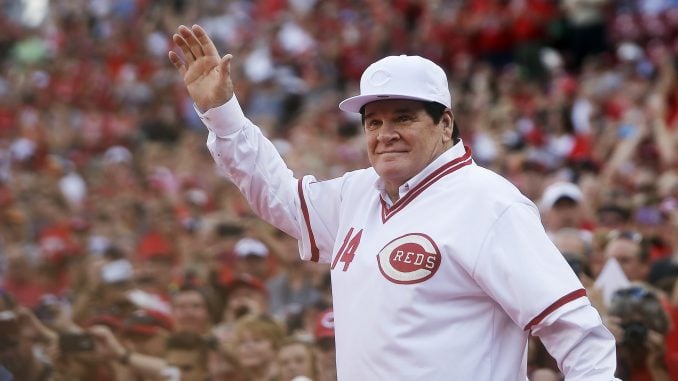
LAS VEGAS — Pete Rose was taking a break from signing autographs at the MGM Grand hotel when asked a question he’s uniquely qualified to address.
What’s worse, betting on baseball or cheating at baseball?
“I don’t know,” Rose tells The Associated Press. “All I know is I’ve been suspended for 30 years now. I don’t know anybody that’s been suspended for 30 years.”
It’s a fair point, especially when compared to the punishments handed out so far in the worst scandal to hit baseball since the steroid era. What Rose did was wrong — according to baseball rules — but there’s still a lot of people who believe he should be adding a Hall of Fame designation when he signs memorabilia in his adopted hometown of Las Vegas.
Still, 30 years away from the game he was so great at seems like an awful long time, especially when Major League Baseball and other sports leagues have made their peace — and are doing business — with the bookies who post lines on their games.
And face it. If you believe Rose on the details of what he did — and that’s a stretch for some — his betting didn’t have nearly the impact on baseball than a cheating scheme that has brought into question the legitimacy of not just one, but two, World Series.
“Which one is worse, stealing signs electronically, taking steroids or betting on baseball?” the all-time major league hit leader asked. “All three are bad. But at least what I did never had anything to do with the outcome of the game.”
The Astros cheating scandal, of course, is still new, at least publicly. A week ago, no one was questioning whether the Astros were really the 2017 champions or the Red Sox a year after that.
Now it’s all in play, and the discussion is beginning to turn to how the sign scandal ranks with other scandals in baseball history.
Pretty high up with each passing day, if only because there are few comparable scandals and two of them involve gambling. The Black Sox scandal of 1919 and Rose betting on baseball games from the dugout in Cincinnati are about the only ones that come close.
There’s also the steroid era, where it was hard to figure out what was real and what wasn’t. The players themselves weren’t much help, sticking up for teammates and for the most part claiming ignorance of steroid use.
The unwritten baseball code of silence, though, seems to be unraveling quickly with the sign-stealing scandal. That began in November when former Houston pitcher Mike Fiers went on record to The Athletic about the scheme the Astros employed during his time there to steal signs.
Dodgers pitcher Alex Wood, a Charlotte native who was careful to hide his signals in allowing one hit in 5 2/3 innings of Game 4 of the World Series, tweeted that he would rather pitch to a player on steroids than one who knew which pitch was coming. That sentiment was echoed by Reds pitcher Trevor Bauer, who added, “All day every day for the rest of time.”
National League MVP Cody Bellinger went even further, saying there needs to be major consequences for any players involved.
“That Completely ruins the integrity of the game!!!” Bellinger tweeted.
Rose said he wished the scandal wasn’t playing out a month before pitchers and catchers report for spring training. He predicted Commissioner Rob Manfred will have a hard time dealing with the fallout.
But he agreed with Bellinger that if players are guilty, they need to be punished, just as he was.
“If you’re the batter and I give you the indicator, aren’t you just as guilty being the batter?” he asked. “It’s the batter who is benefiting from this, not the guy who was the indicator. You have to look at every player on the team.”
Rose, who turns 79 in April, said there was sign-stealing during his time, though without technology. Mostly, it was a base coach figuring out sign sequences and a runner at second relaying them to the batter, and there were accepted ways to make it stop.
“Usually what would happen is the pitcher would throw it right at a guy’s head,” he said. “Ninety of 100 would stop because they don’t want that chin music.”
But while Rose was guilty of doing things not in the best interest of baseball, he said he wasn’t much of a sign thief.
“I batted 15,000 times and I never wanted a guy on second to tell me what was coming,” he said. “I didn’t want to know because he might be wrong and I wasn’t a guess hitter anyway so it wouldn’t have helped me much.”
It did help, Rose said, the home run hitters who liked to guess on what pitches were coming. And that, he added, holds true today.
“It’s a bigger thing for home run hitters,” he said. “I played with a lot of guys who were home run hitters and you tell them what’s coming and they would hit it out of Yellowstone Park.”



